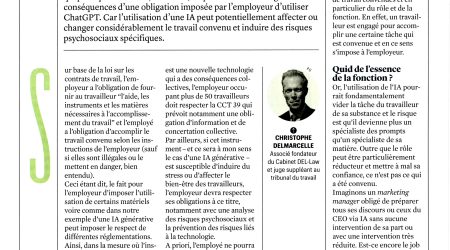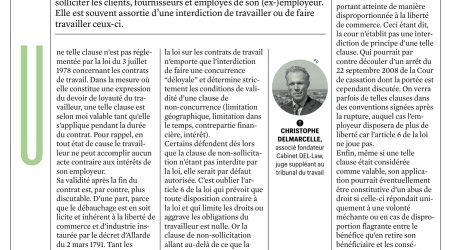Caution if a former colleague opposed to your employer asks you to testify in their favor
Posted the 30 June 2025An employee is approached by a former colleague who is in conflict with the employer, asking them to provide documents (emails or others) and make a statement in their favor and against the employer. Is the employee taking a risk by accepting?
Under the employment contract, the employee and the employer owe each other mutual loyalty. This is codified in Article 16 of the law of July 3, 1978, which states that “It is evident that a statement made by a worker in favor of a colleague or former colleague in the context of a legal dispute with the employer is likely to harm the interests of the employer or run counter to them.”
This duty of discretion and confidentiality is logical, as it serves to preserve the existing employment relationship. It especially applies when a witness confirms failings or makes a highly critical statement about their employer, or when they provide confidential information, emails, or communications that the colleague does not or no longer have access to, and that are not publicly available.
At this stage, the loyalty owed to the employer under the employment contract would require the employee to refrain from causing harm to the employer, which would likely be the case if the testimony or documents incriminate the employer (even if the documents are not confidential in nature). Additionally, there is the legal prohibition against defamation or the risk of computer fraud. Furthermore, under the same Article 17, the worker is also obligated to keep confidential any personal or confidential matters relating to the employer that were obtained in the course of employment.
Moreover, such testimony, even concerning matters covered by the law of November 28, 2022 on the protection of persons who report violations of Union or national law (whistleblowing) such as public procurement, health, or tax fraud will not result in protection unless an internal or external report has already been made.
The right to testify in court
That being said, the French Court of Cassation, in its judgment of July 10, 2024, ruled that testifying in court is a fundamental right derived from Articles 6 to 10 of the European Convention on Human Rights, which overrides the duty of loyalty to the employer, meaning that the dismissal of a worker who has testified is void.
In any case, giving a good-faith testimony that factually confirms the behavior of a colleague, their qualities, their way of working, or even their feelings, without issuing any criticism of the employer or taking a position on their responsibility or possible wrongdoing, appears to be more acceptable.
Naturally, an employee who wishes to regain the freedom to testify may resign, or more simply, the former colleague may request the court to summon the employee as a witness, in which case the employee will be legally obliged to tell the truth, and this legal obligation will prevail over the duty of loyalty in the absence of a regulated professional secret.
It is clear that the issue is sensitive, and the employee asked to testify would do well to exercise caution in order to avoid possible dismissal for serious misconduct or a claim for damages, or even a complaint.
Related articles

Is an employer allowed to mandate the use of artificial intelligence tools by employees ? (Trends, 17-07-2025)

Social TV Show #1 | The Flexibility of Remuneration and Salary Transparency
